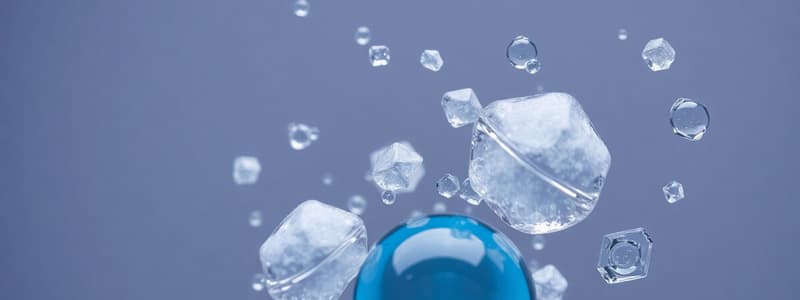Podcast
Questions and Answers
What defines a pure substance?
What defines a pure substance?
- Can contain multiple types of particles
- Contains only one type of particle (correct)
- Is made of different types of molecules
- Is always a mixture
Which phase change occurs when a liquid turns into a gas?
Which phase change occurs when a liquid turns into a gas?
- Condensation
- Evaporation (correct)
- Sublimation
- Melting
What property would you measure to determine the resistance of a substance to being scratched?
What property would you measure to determine the resistance of a substance to being scratched?
- Density
- Malleability
- Viscosity
- Hardness (correct)
What is the role of temperature in particle motion?
What is the role of temperature in particle motion?
Which of the following best describes a heterogeneous mixture?
Which of the following best describes a heterogeneous mixture?
What is the formula to calculate density?
What is the formula to calculate density?
Which of the following is a qualitative physical property?
Which of the following is a qualitative physical property?
What chemical property involves a substance's reaction to oxygen?
What chemical property involves a substance's reaction to oxygen?
What is a characteristic of a chemical change?
What is a characteristic of a chemical change?
Which of the following represents a synthesis reaction?
Which of the following represents a synthesis reaction?
Which event is NOT evidence of a chemical change?
Which event is NOT evidence of a chemical change?
What distinguishes complete combustion from incomplete combustion?
What distinguishes complete combustion from incomplete combustion?
In a neutralization reaction, which products are typically formed?
In a neutralization reaction, which products are typically formed?
Which of the following is an example of a decomposition reaction?
Which of the following is an example of a decomposition reaction?
What happens in a single displacement reaction?
What happens in a single displacement reaction?
What defines a double displacement reaction?
What defines a double displacement reaction?
Flashcards
Chemical Change
Chemical Change
A change where one or more new substances are formed.
Reversible Change
Reversible Change
A change that can be reversed, usually by physical means.
Synthesis
Synthesis
A type of chemical change where two or more simpler substances combine to form a more complex substance.
Decomposition
Decomposition
Signup and view all the flashcards
Single Displacement
Single Displacement
Signup and view all the flashcards
Double Displacement
Double Displacement
Signup and view all the flashcards
Combustion
Combustion
Signup and view all the flashcards
Neutralization
Neutralization
Signup and view all the flashcards
Particle Theory of Matter
Particle Theory of Matter
Signup and view all the flashcards
Pure Substance
Pure Substance
Signup and view all the flashcards
Mixture
Mixture
Signup and view all the flashcards
Qualitative Physical Property
Qualitative Physical Property
Signup and view all the flashcards
Quantitative Physical Property
Quantitative Physical Property
Signup and view all the flashcards
Chemical Property
Chemical Property
Signup and view all the flashcards
Physical Change
Physical Change
Signup and view all the flashcards
Solubility
Solubility
Signup and view all the flashcards
Study Notes
Matter and its Properties
- Matter is anything that has mass and volume and inertia.
- Pure Substances consist of only one type of particle (atom or molecule). These can be elements or compounds.
- Elements contain only one type of atom and cannot be broken down into simpler substances.
- Compounds are single types of molecules formed from different types of atoms.
- Mixtures are impure substances where two or more compounds are not chemically bonded together.
- Homogeneous Mixtures have evenly distributed particles, making the different particle types indistinguishable.
- Heterogeneous Mixtures have unevenly distributed particles, the different components can be observed.
Physical Properties
- Qualitative physical properties can be observed and described but not measured:
- Color
- State (solid, liquid, gas)
- Texture
- Lustre (shininess)
- Optical clarity (transparency)
- Malleability (ability to be hammered into sheets)
- Ductility (ability to be drawn into wires)
- Quantitative physical properties can be measured:
- Boiling point
- Melting point
- Height/length/width
- Viscosity (thickness, high viscosity = thicker like honey)
- Solubility (ability to dissolve, usually in water)
- Hardness (resistance to scratching)
- Conductivity (ability to conduct heat or electricity)
- Density (mass/volume, usually g/cm³)
Phase Changes
- Phase changes involve transitions between states of matter:
- Sublimation: solid to gas
- Deposition: gas to solid
- Evaporation: liquid to gas
- Condensation: gas to liquid
- Melting: solid to liquid
- Freezing: liquid to solid
Calculations
- Density (D) = Mass (M) / Volume (V)
- Mass (M) = Density (D) * Volume (V)
- Volume (V) = Mass (M) / Density (D)
- Units matter! (e.g., g/cm³, g, cm³)
Chemical Properties
- Chemical properties describe a substances ability to react with other substances to form new substances.
- Examples include:
- Reactivity with oxygen (oxidation)
- Reactivity with acids/bases (acidity/basicity)
- Combustibility
- Stability
- Toxicity
- Flammability
- Radioactivity
Changes in Matter
- Physical change: A change in appearance/state that doesn't form new substances. Usually reversible.
- Chemical change: A change that forms one or more new substances. Usually not reversible.
Evidence of Chemical Change
- Color change
- Formation of a new solid (precipitate)
- Production of a gas (bubbling, odor change)
- Production of a new odor
- Absorption or release of heat/light (energy change)
- Difficulty reversing the change
Types of Chemical Reactions
-
Synthesis: Two or more substances combine to form a more complex substance (A + B → AB).
-
Decomposition: A complex substance breaks down into simpler substances (AB → A + B).
-
Single Displacement: One element replaces another element in a compound (AC + B → BC + A).
-
Double Displacement: Two elements in different compounds switch places (AC + BD → AD + BC)
-
Combustion: A substance reacts with oxygen, frequently producing energy, CO2, and Water (CH₄ + 2O₂ → CO₂ + 2H₂O). (Complete vs Incomplete) (Multiple examples provided)
-
Neutralization: An acid and base react to form a salt and water, often resulting in a pH closer to neutral (HA + BOH → AB + HOH). (Multiple examples provided)
Studying That Suits You
Use AI to generate personalized quizzes and flashcards to suit your learning preferences.




